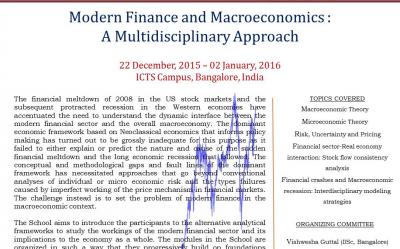The financial meltdown of 2008 in the US stock markets and the subsequent protracted recession in the Western economies have accentuated the need to understand the dynamic interface between the modern financial sector and the overall macroeconomy. The dominant economic framework based on Neoclassical economics that informs policy making has turned out to be grossly inadequate for this purpose as it failed to either explain or predict the nature and cause of the sudden financial meltdown and the long economic recession that followed. The conceptual and methodological gaps and fault lines of the dominant framework have necessitated approaches that go beyond conventional analyses of individual or micro economic risk and the types failures caused by imperfect working of the price mechanism in financial markets. The challenge instead is to set the problem of modern finance in the macroeconomic context.
This School aims to introduce the participants to the alternative analytical frameworks to study the workings of the modern financial sector and its implications to the economy as a whole. The modules in the School are organized in such a way that they progressively build on foundations starting from a critical perspective of macroeconomic analysis to lead the participants gradually to broader analysis beyond that is provided in the standard economic theory. The lectures will then build on this alternative conceptual perspective and explore and articulate alternative methodological frameworks in which the local or micro aspect of individual risk are integrated with the global or macro aspect of finance and money in the economy.
The list of speakers includes renowned economists and mathematicians from India and abroad.
 icts
icts res
res in
in

